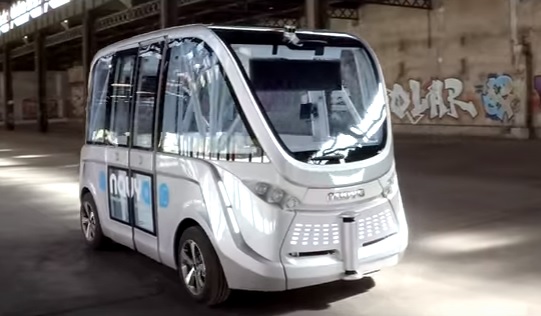A year-long trial of driverless buses has started in Lyon in what officials have described as a ‘world first’.
Two shuttle buses, which hold up to 15 passengers at a time, have started operating along a 1.3km stretch of public streets in the Confluence quartier of the city.
The route includes five stops and to travel the entire length takes about 10 minutes, traffic conditions permitting.
Using the service is free for the duration of the trial.
The two electric vehicles, fitted with high-tech equipment including laser sensors, stereo vision and GPS, can ferry around 15 passengers at a top speed of 20 kilometres an hour (12 mph).
The initial route in the heart of the city will last 10 minutes and include five stops.
Manufactured by the French firm Navya and costing 200,000 euros ($225,000) apiece, a prototype was tested in 2013.
The minibuses have already been tested in other French cities as well as in Sion, Switzerland, but without carrying passengers.
Driverless electric minibuses made by other companies have also been tested in the western French city of La Rochelle as part of a European experiment.
The buses attracted considerable attention on their first day in operation. Curious onlookers took ‘selfies’ beside the vehicles, which allow passengers to stand at the front and enjoy the journey from a “driver’s eye view”.
Christophe Sapet, chief executive of the Navya company which designed the buses, said: “They’re equipped with a range of detectors that allow them to know exactly where they are and to detect everything happening around them and to manage it intelligently to avoid collisions.”
Nevertheless, the buses are not capable of manoeuvring around other traffic and the routes are near a tramway where other vehicles are not allowed.
“Neither the current technology nor the legislation allow this type of vehicle to operate in the midst of cars or other traffic,” said Jean-Pierre Farandou of the Keolis transport group that operates the service.
Navya has taken about 30 orders for the vehicles and plans to develop larger buses able to carry 20 passengers.
The next step will be driverless cars, Sapet said. “We can compete with Google and Uber cars without drivers… A driverless French car operating in city centres can become a reality as early as 2018.”
